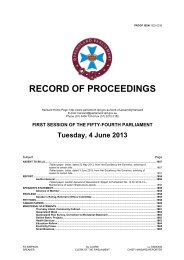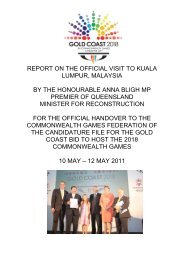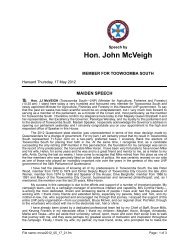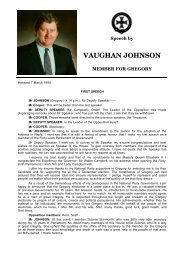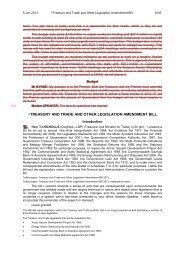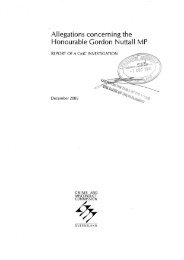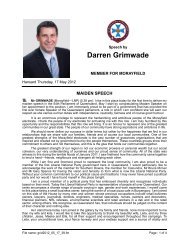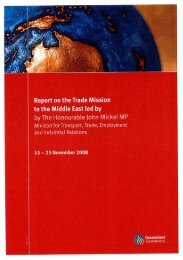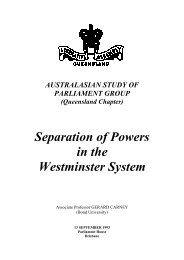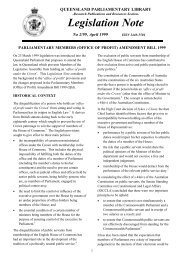weekly hansard - Queensland Parliament - Queensland Government
weekly hansard - Queensland Parliament - Queensland Government
weekly hansard - Queensland Parliament - Queensland Government
Create successful ePaper yourself
Turn your PDF publications into a flip-book with our unique Google optimized e-Paper software.
23 Aug 2005 Plumbing and Drainage and Other Legislation Amendment Bill 2627<br />
the bill are, in fact, extremely limited, and entry other than by consent or warrant is only to public places<br />
where members of the public are entitled to enter under ordinary circumstances. Suitable safeguards in<br />
relation to entry and post-entry powers are included in these provisions.<br />
Secondly, the committee notes that the bill inserts two definitions incorporating terms of external<br />
and government generated documents which are not subordinate legislation. The incorporation of these<br />
documents is considered appropriate in these circumstances to standardise terminology consistent with<br />
nationally agreed codes. The Plumbing Code of Australia is a national code developed by the National<br />
Plumbing Regulators Forum that documents nationally agreed performance requirements for plumbing<br />
and drainage. It also contains product authorisation and certification processes that underpin national<br />
standards. This code is adopted in whole or in part by each state and territory. A similar arrangement<br />
applies with the Building Code of Australia.<br />
I now turn to the issues raised by members during the debate. I thank the honourable member for<br />
Mirani for his support in general for the bill and I thank him for his comments with which for the most part<br />
I agree. Insofar as his comment about the enforcement provisions is concerned and a question that he<br />
raised, in his tone at least, as to whether they are a bit over the top, the enforcement powers in the bill<br />
are really quite constrained when examined more closely, and they are only what is needed to make<br />
sure operators are complying with the legislation.<br />
The bill also contains suitable safeguards against the misuse of enforcement powers. This issue<br />
was brought to my attention in one of my early meetings with the Plumbers and Drainers Board. The<br />
Plumbers and Drainers Board—which is, indeed, a valiant organisation and, I might say, hardworking—<br />
meets infrequently but, nonetheless, gets on with the business of ensuring that there are proper<br />
standards in the plumbing and drainage work done around <strong>Queensland</strong>.<br />
The board has a significant role in the licensing of plumbers and drainers. Members of the board<br />
expressed to me their concerns that the health risks and the safety risks of <strong>Queensland</strong>ers would be<br />
considerable were we to have unlicensed people or people with licences performing work of a lower<br />
standard. Should the board receive reports that seem to have some substance alleging that work is<br />
substandard or being done by somebody who is not properly licensed, then it needs powers in<br />
exceptional circumstances to investigate and ensure that the standards are being maintained.<br />
I also take this opportunity to let members know that Mr Jorgen Gullestrup from the Plumbers<br />
Union—a man whom I know only too well is devoted not only to dealing with the issues of the day for<br />
plumbers and drainers but also to ensuring that there are good career paths for plumbers in years to<br />
come and, I might say, is putting his mind to the issue of more women in the industry—has been<br />
concerned, as all good professionals are, to make sure that all of the good operators in the field are not<br />
in any way besmirched, as it were, by poor practice by the occasional individual. I thank him for his<br />
general support for this bill and I give recognition to the important work that he and all of the members of<br />
the union do all over <strong>Queensland</strong>. It is work that many of us in our households and in our businesses<br />
take for granted.<br />
The member for Mirani raised the issue of what other states of Australia have done with regard to<br />
grey water reuse. In most other states—New South Wales, South Australia, Western Australia and<br />
Tasmania—there are processes in place to regulate the installation of grey water facilities. However, I let<br />
honourable members know that in Victoria, where grey water usage has not been so strictly controlled,<br />
they have had a problem with grey water causing an environmental nuisance, and they are now moving<br />
in Victoria to introduce stricter controls. The member also raised the issue of whether incentives should<br />
be in place to encourage grey water facility installation. He quite rightly made the point that the cost of<br />
installation will be difficult indeed for those retro-fitting houses on slabs. There is no doubt that the cost<br />
will be considerable in those circumstances.<br />
Funding at this point is being provided. However, this is in the first instance to support local<br />
governments in implementing the legislation, in assessing applications, in training and in making sure<br />
that the system is working. It is anticipated that, with the introduction of this legislation, builders will in<br />
future fit piping to houses, even houses on slabs, so that they are grey water ready. While that does not<br />
address the problem of retrofits, I think, nonetheless, that it is sensible in government to make one<br />
significant change such as this and to allow some time for that system to be in place to see how it works.<br />
Also of relevance on this particular issue is that all over the state of <strong>Queensland</strong> we are getting<br />
the message that we will pay for our water one way or another and that, because it is so important, we<br />
must use it wisely. We are getting the message that the precious resource of water will have to be paid<br />
for, perhaps by reducing our use of potable water and putting our money instead into recycling initiatives<br />
or grey water, through the councils via our rates or through various water bodies.<br />
The member asked what is being done to train council officers. I am able to tell him that an<br />
extensive training program is proposed that will assist councils to understand the proposed legislation<br />
and the new Plumbing and Wastewater Code. The new code for grey water use will assist councils<br />
understand the grey water technical requirements. The government has allocated significant funds for<br />
training and public information. Nonetheless, this needs to be an optional matter for local governments<br />
not only for soil variation reasons and even resourcing and training capacities within councils but also



